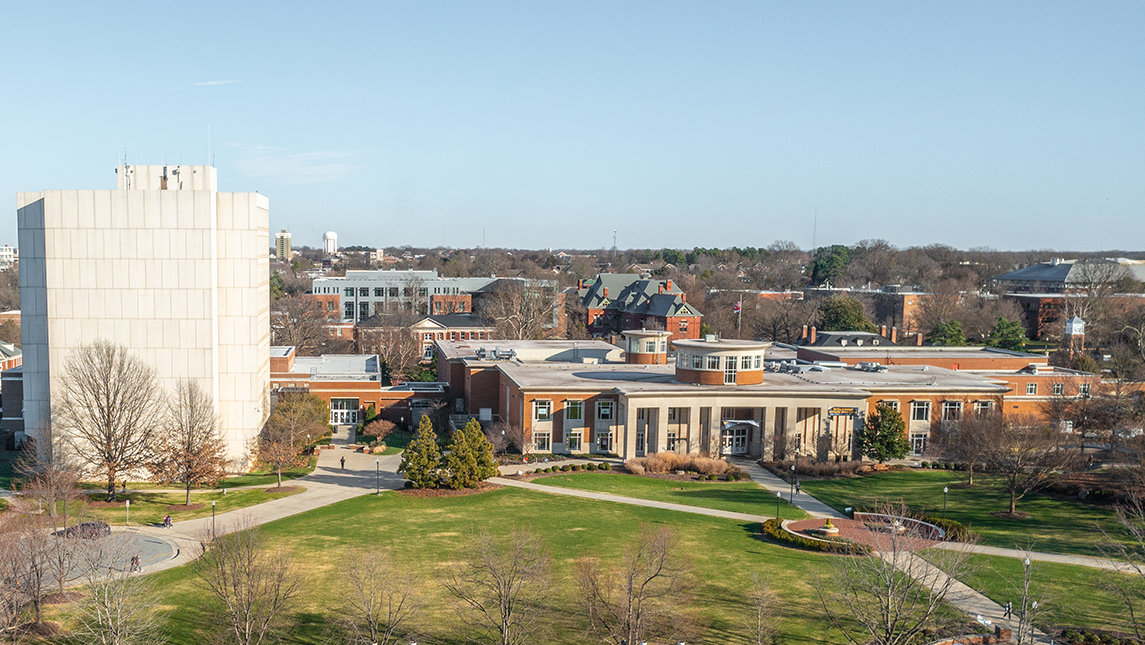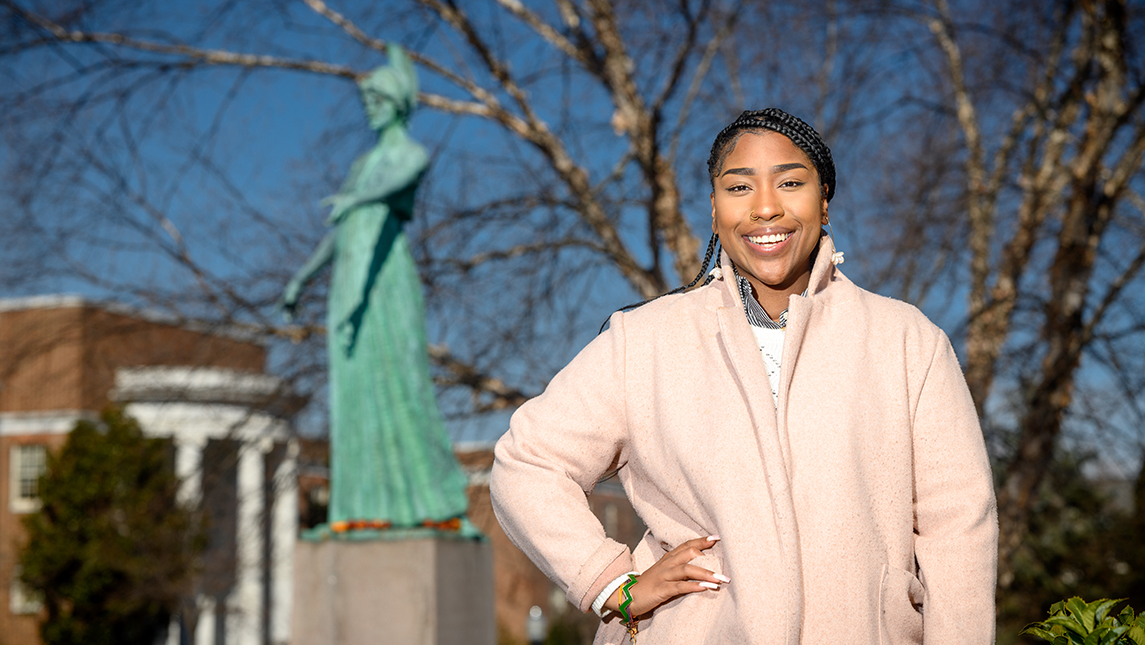
UNC Greensboro is celebrating Black History Month by hosting a variety of free, in-person and virtual events, and by sharing campus and community history, recommended faculty reading and resources, and student and alumni voices on racialequity.uncg.edu.
One of these voices is that of History and African American and African Diaspora Studies Student Allyson Beatty:

“Sometimes we take history for granted because it encompasses a lot of pain and frustration, but we have to be able to learn and move forward with progression! Black History Month has evolved into a month full of education and pride in where we came from, but also an opportunity to shed light on the advancements and accomplishments of our people as well.
I really love learning history. My grandmother was a librarian who was really interested in our family’s genealogy. She taught me to always know where you came from and know where you’re going. If we can learn from our past, we can prepare for our future.
As students we should continue to ask questions and actively seek diverse groups of perspectives. Learning about different cultures and experiences can only bring us closer.”
Spartans are encouraged to share their Black History Month reflections on social media by tagging #UNCG and #UNCGBlackHistory and participate in upcoming events on campus:
First Fridays, Conversations with Archivists: Triad Black Lives Matter Project
Feb. 4 at 12 p.m. via Zoom
Join Stacey Krim and David Gwynn for a conversation about the Triad Black Lives Matter Project, hosted by Beth Ann Koelsch.
Lunch & Learn: Queer and Black
Feb. 7, 12 p.m. in the Intercultural Resource Center, EUC 062
We have always been here. Black queer people have experiences life through the multimarginalized perspective that can seem isolating even within their own communities. In this discussion, we hope to bring resources for Black queer individuals as well as celebrate and honor the indelible impact this group has had on the world.
Student Activism/Power in Voices
Feb. 9, 4 p.m. via Zoom
What does it mean to engage in activism as a student? The panel will explore the impact that students have had in changing things not only on their campus, but in the world. Special guest panelists include members from Solutions Not Punishments Collaborative and North Carolina Black Leadership & Organizing Collective.
Screening of “February One: The Story of the Greensboro Four”
Feb. 10, Intercultural Resource Center, EUC 062
Four students from North Carolina A&T State University made a decision that would shift the culture, the law, and our history forever when they decided to stage a sit-in here in Greensboro. This film discusses the motivations, preparation, and impact the A&T Four had on the civil rights movement and the journey to equality.
“How Do I Look? Lorraine O’Grady: Both/And”
Feb. 10, 6 p.m. via Zoom
African American and African Diaspora Studies faculty Dr. Jazmin Graves and Dr. Neelofer Qadir explore the Weatherspoon Art Museum’s newest exhibit.
Frederick Douglass Day: Black Women in the Archives
Feb. 14, 12-3 p.m. via Zoom or in MHRA 1305
In honor of Frederick Douglass’s birthday and the Black activist networks predating 20th century organizations such as the NAACP, please join Dr. RJ Boutelle, professor of English and African American and African Diaspora Studies, in learning about this year’s Colored Conventions Movement theme: Black Women in the Archives.
Students will learn about the 21st century scholarly activism recovering Black women’s voices in the archives, and participate in transcribing some of these archives. Register for the event here.
Dialogue: Birthing Inequity
Feb. 14, 3-4 p.m. via Zoom
Black birthing partners are disproportionately at risk compared to their non-black counterparts. The mortality rate is alarming, yet no one is doing anything about it. Or are they?
Dialogue: Environmental Racism + Housing
Feb. 16, 5 p.m. in the Intercultural Resource Center, EUC 062
Did you know that where your home is located has a direct impact on not only the quality of life that you will have but your upward mobility, health, and ultimately your lifespan? What if you found out this is a part of the plan? Join us to learn more about the impact environmental racism has on Black people in the past and present.
Screening of “13th”
Feb. 17, 12 p.m. in the Intercultural Resource Center, EUC 062
Filmmaker Ava DuVernay explores the history of racial inequality in the United States, focusing on the fact that the nation’s prisons are disproportionately filled with African-Americans.
Dialogue: Prison Abolition V. Reform
Feb. 17, 3 p.m. in the Intercultural Resource Center, EUC 062
Seeking justice beyond the punishment system, transforming how we deal with harm and accountability, and finding hope in collective struggle for abolition, Mariame Kaba’s work is deeply rooted in the relentless belief that we can fundamentally change the world. We will delve into the cases for prison reform or prison abolition
Women’s Basketball Game honoring Black History Month
Feb. 19, 4 p.m., Fleming Gym
Honor Black History Month and cheer on the Spartans. The first 100 students to attend will receive a free t-shirt.
Dialogue: Black and Disabled
Feb. 21. 1 p.m. via Zoom
The Women Veterans Historical Project Celebrates Black History Month
Feb. 22, 12 p.m. via Zoom
Conference on African American and African Diasporic Cultures and Experiences (CACE)
Feb. 22-23, 8 a.m.-8 p.m., Register here
The theme of this year’s student-run conference will be “And Still We Rise: Black Spacemaking, Place, and Community,” featuring traditional papers, roundtables, and other creative formats highlighting and interrogating the ways in which peoples of the African diaspora transform, make sense of, interact with, or challenge their environment through visual art, poetry, museums, and other mediums. How have African descended peoples renamed public histories, reshaped politics and academia, reimagined social justice, and redefined equitable health care?
Da’Shaun Harrison: Belly of the Beast Anti-Fatness as Anti-Blackness
Feb. 23, 4-6 p.m., virtual
Join us for a virtual conversation with activist and author of “Belly of the Beast: The Politics of Anti-Fatness as Anti-Blackness” Da’Shaun L. Harrison (they/them) who discusses Blackness, queerness, gender, fatness, disabilities, and their intersection. Register for the virtual event here.
Screening of “Just Mercy”
Feb. 24, 4 p.m. in the Intercultural Resource Center, EUC 062
Bryan Stevenson heads to Alabama to defend those wrongly condemned or those not afforded proper representation.
Black Dance: Shifting Culture and Defying Gravity by the Clarice Young Project
Feb. 24, 7-8 p.m. at Greensboro Project Space, RSVP here.
Black Dance: Shifting Culture and Defying Gravity celebrates the powerful influence Black dance has on culture. Black dance is an influential tool which is often commodified and where profits and credit are seldom given to the creators or originators. Experiments recently done on social media have made us aware that the world doesn’t move unless Black people move. With this project, Young provides a glimpse of how moments of play and spontaneity can easily turn into a performance amongst friends, families, and even strangers. For no matter where it is done, Black dance always finds a way to shift culture and continues to defy gravity.
Dialogue: Black Storytelling in Media
Feb. 28, 12 p.m. via Zoom
Storytelling is a pillar in the experiences of Black folks. As the late Congressman John Lewis, a standard bearer of the civil rights movement and equity in this country, said, “The movement without storytelling, is like birds without wings.” It has served as a way to remember what was stolen or what once was, create new and better worlds, and connect the community.
Check out more student and alumni voices, histories, recommended faculty reading, and more at racialequity.uncg.edu.


